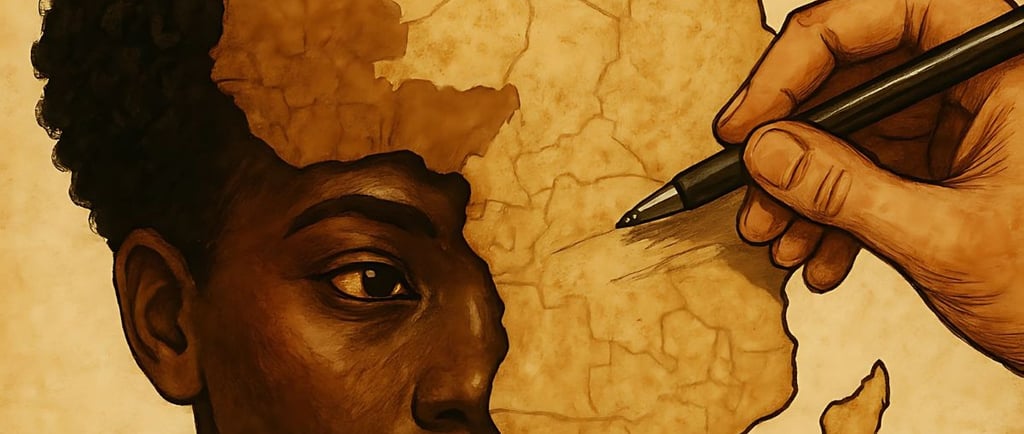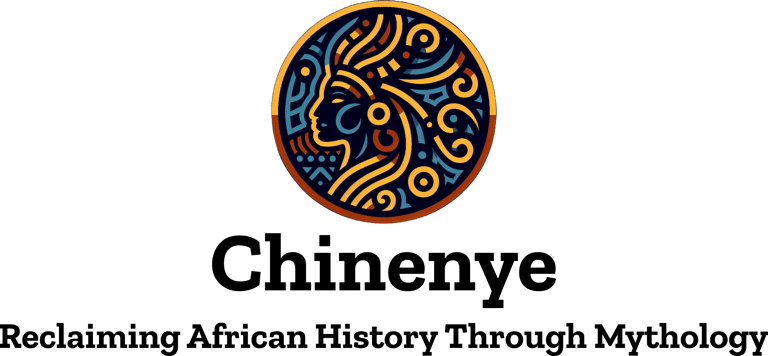The Overwriting of the African and Black Identity
Before the era of slavery and colonialism, African identity was sacred and structured. This post explores how empires overwrote it and how we can reclaim it.
OVERWRITTEN
Chinenye Egbuna Ikwuemesi
7/18/20254 min read


The Overwriting of the African and Black Identity
Before slavery. Before colonialism. Before the imperial logic of theft and humiliation. There was the African identity.
A magnificence and plurality - yes, but never broken.
Grounded in land, clan, cosmology, and responsibility and understood through names, rites, bloodlines and godlines. What it meant to be African was not invented in reaction to white violence. It was known and practised long before it was interrupted. And it was overwritten not because it was absent, but because it was structured, remembered, and powerful. Because successive empires strove to erase its history just as hard as, (and because) it strove to subjugate and destroy The African.
Across the kingdoms of Ife and Benin, to Kongo, Axum, and Songhai, identity was civic and spiritual. To be a man was to be a bridge between generations, accountable not only to your immediate household but to the ancestors behind you and the unborn ahead. To be a woman was to be a living altar. A midwife of spirit and society alike. Women carried rites of life and death: as midwives, as bone-setters, as surgeons of the body and the soul. They were priestesses, healers, suturers of clan wounds and holders of arcane and taboo knowledge. The shrinekeeper, the herbalist, the initiator, and the singer of ancestral truths were women. And they were not marginal. They were sovereign in their spheres.
Kings were not simply rulers; they were priests and cosmological anchors, holders of balance and order. A name was not a label. It was a prophecy. Lineage was not personal history; it was a living thing, legal, regal and remembered by griots and inscribed in ritual. To be a daughter was to carry the honour of generations. To be a child was to be recognised not by one’s parents alone, but by the entire community, and beyond that by the spirit-world which watched and recorded.
The family was not simply nuclear. It was a legal, political, and cosmological unit. Citizenship was not a document. It was a participation in a moral economy governed by principles far older than Europe’s civil codes. Rights came with rites. Responsibilities with rituals. There was no vacuum of law or identity. Mythology served as the foundation upon which obligations and mores were established. The Orisa, the Abosom, the Kalunga, the Mbari houses, the Bantu cosmograms - all of them were not folklore but civilisational software. The gods were not floating abstractions. They were encoded systems of social logic.
Then came the disruption.
Two axes of destruction - transatlantic and trans-Saharan slavery systems - converged to dislodge African people from their land, their names, their kin, their cosmologies, and their archives. The transatlantic slave trade would steal millions, not only from land but from memory. The sub-Saharan slave trade, led by Arab powers, would assault African identity in different but equally enduring ways. Castration, concubinage, linguistic annihilation, forced religious conversion, and cultural rupture. The destruction was deliberate and long-lasting, and in many ways, still largely untold and unacknowledged.
Empire needed not only bodies, but stories. And so, it made up new ones. It rebranded African identity as primitive, violent, hypersexual, lazy, and illogical. The very tools of cosmology and governance: drumming, possession, trance, incantation, initiation, were rewritten as superstition, devil worship, hysteria. The African king was now a savage. The African woman a temptress. The African man was a family neglecting brute. The African child a blank devoid of promise, future or the possibility of rights. The African name a burden. The African places, while places of untold exploitation, were at the same time a sea of savagery, a desert of darkness and waste and problematic in every particular,
This overwriting programme was not only political. It was epistemic. It was semiotic. It was ontological. A people whose entire system of self-definition was held in ceremony, narrative, kinship, ritual and rhythm were forced into worlds that required papers (in foreign languages, it must not be forgotten), surnames (often from the colonial canon and tongue), silence, shame and which had to endure erasure.
In the Americas, Kene became John. Fatou became Frances. Cosmology was beaten out of children on the plantation. Whole generations grew up with no memory of their ancestral names, their clan totems, their native tongues, or their burial rites. Blackness was redefined through the lens of captivity. Black identity became reactive, defensive, and wounded. In the Caribbean, British administrators implemented policies to disrupt kinship networks and discourage the retention of African cultural practices. In Brazil, Portuguese names buried Yoruba ones, except where Candomblé and the terreiro resisted in secret. In Haiti, only through fire and blood did memory fight its way back. And they have paid dearly for it, the only nation to ever have to pay another reparations over slavery - the victims to the kidnappers, traffickers and slavers.
In North Africa and the Gulf, generations of African descent were made invisible. Their languages scrubbed out, their skin lightened through forced breeding, their status reduced to concubines and eunuchs. In East Africa, Arabs branded children, redefined their caste, and erased their tongue. The theft of identity was not a side effect. It was the goal.
And the images that followed were not accidental. The colonial museums collected African masks and called them “artifacts” of the past but they were civic memory. The European textbooks portrayed Africa as a land without history, some even said it was 'ahistorical' while its art was being stolen wholesale. The American film industry cast Blackness as violent or comic, never sovereign. The Arab imagination made the African body a slave-body. The Western one made it a deviant-body. The world internalised both.
But, you ask, what did it mean to be African before all this, then?
African identity was meant to be embedded. To be African in precolonial times meant you were acknowledged. It meant you were responsible, that you would be remembered. It meant being part of a living and dying cycle that spoke your name across thresholds and expected you to carry the weight of your people with dignity. To be African was to be, and to continue.
What does it mean now, after centuries of interruption? It means remembering again. It means scraping back the veils. It means rejecting every stereotype invented by the empires, whether British, French, Belgian, Arab or American. It means understanding that our present-day identity is not a natural evolution but a deeply constructed response to trauma, theft, and misrepresentation.
This series, Overwritten, will map that construction. Piece by piece. From naming to family, from gender to kingship, from worship to language, from diaspora to digital. It will name what was lost, what was taken, and what must be remembered.
Because African identity was not born in chains or poverty or loss or opprobrium.
It was buried beneath them.
And we are digging. Not just for memory, but for the blueprints of restoration.
Reframing African History by Reclaiming African Mythology
Restoring African mythology through innovative storytelling.
chinenye@chinenye.co.uk
© 2025. All rights reserved.
